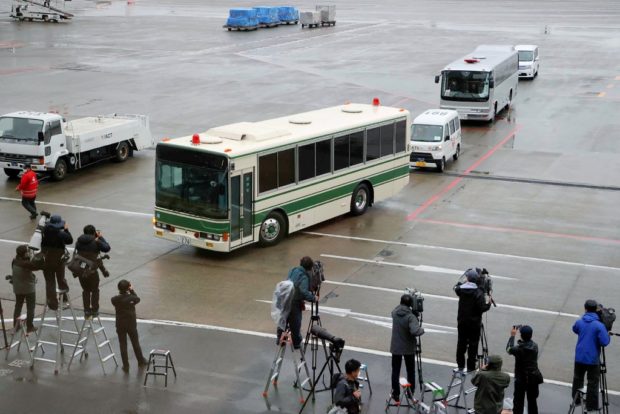
A bus (front) believed to be carrying former US special forces member Michael Taylor and his son Peter who allegedly staged the operation to help fly former Nissan chief Carlos Ghosn out of Japan in 2019, leaves Narita airport in Chiba prefecture on March 2, 2021, following their extradition from the US. (Photo by STR / JIJI PRESS / AFP) / Japan OUT
TOKYO — A US father-son pair accused of helping former Nissan boss Carlos Ghosn in his audacious escape from Japan arrived in Tokyo on Tuesday after losing their battle against extradition.
In a statement, Japanese prosecutors confirmed they had arrested former US special forces member Michael Taylor and his son Peter “on suspicion of helping a criminal hide and escape.”
The pair, along with a third man still at large, is believed to have masterminded the operation that saw former international jet-setter Ghosn packed into an audio-equipment case and onto a private jet to jump bail in December 2019.
While Ghosn is now beyond the reach of Japanese justice in Lebanon, which does not have an extradition treaty with Tokyo, the Taylors were handed over to Japanese prosecutors earlier Tuesday in the US.
“The two suspects, knowing Carlos Ghosn was on bail on condition that he not go abroad… helped Ghosn to escape,” prosecutors said in a statement after the men arrived.
They landed at Narita airport outside Tokyo, where officials held up silver plastic sheets to shield the arrivals from cameras. They will be taken to a detention center after clearing immigration and taking a Covid-19 test, local media reports said.
Prosecutors can now hold the men for around 20 days before they have to bring formal charges against them.
The Taylors were arrested in the US last year after Japan issued a warrant for them. The pair tried to block Japan’s extradition request, with their lawyers claiming the men would face torture-like conditions in Japan, but the US Supreme Court struck down their appeal in February.
“This is a sad day for the family, and for all who believe that veterans deserve better treatment from their own country,” Paul Kelly, their lawyer, said in a statement confirming they had been handed over to Japanese custody.
A man (L) believed to be former US special forces member Michael Taylor, who allegedly staged the operation to help fly former Nissan chief Carlos Ghosn out of Japan in 2019, is escorted by Japanese officers as he gets on a bus after arriving at Narita airport in Chiba prefecture on March 2, 2021 following his extradition from the US. (Photo by Kazuhiro NOGI / AFP)
‘Brazen escape act’
Ghosn was a global business superstar and head of an auto alliance joining Nissan, Renault and Mitsubishi Motors before his career came crashing to an abrupt end in November 2018, when Tokyo investigators stormed his private jet to arrest him.
The French-Lebanese-Brazilian national was eventually charged with four counts of financial misconduct over claims he hid compensation and misused Nissan funds.
Having spent months in detention, Ghosn was out on bail awaiting trial on the charges — which he denies — when he fled the country in what Japanese prosecutors termed “one of the most brazen and well-orchestrated escape acts in recent history”.
The escape infuriated Japanese officials, particularly as prosecutors had regularly argued against Ghosn’s release on bail, arguing he was a flight risk.
The details of his escape only proved more embarrassing — with the former tycoon allegedly having boarded a train to Osaka before evading security checks at Kansai airport by boarding a private jet packed into an oversize box that was not scanned.
After his arrival in Lebanon, Ghosn claimed that he had been forced to escape because he feared he would not get a fair hearing.
While Ghosn remains at large, the repercussions of both the original case against him and his escape from Japan continue.
In Tokyo, his former close aide at Nissan, Greg Kelly, is currently on trial for his alleged role in underreporting Ghosn’s income. Nissan itself faces charges in the case and has pleaded guilty.
And last month, a Turkish court sentenced two pilots and another employee of a small private airline to four years and two months in prison for their role in Ghosn’s escape.
Ghosn transited in Turkey, switching planes on his way to Lebanon, and the three Turks were charged with involvement in a conspiracy to smuggle a migrant.
Two other pilots and two flight attendants on trial in Turkey were acquitted.